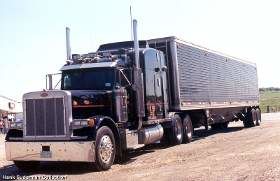Got A Citation!
Topic 14021 | Page 1

Sorry to hear it. I got a citation today too. It brings one to a new low.
Hopefully someone else can advise you. I certainly never get away with anything, not even once.
Passing your inspection gives you some brownie points though. That's really good.
-mountain girl
Almost every company has a policy that any citations must be reported to them. Nothing is going to happen to your job if you report it to your company but if you happen to break company policy that would be considered the bigger deal in this case.
Also, the Federal Government, the FMCSA to be exact, requires that a driver report all violations.
From 383.31: Notification of convictions for driver violations:
(b) Each person who operates a commercial motor vehicle , who has a commercial driver's license issued by a State or jurisdiction, and who is convicted of violating, in any type of motor vehicle, a State or local law relating to motor vehicle traffic control (other than a parking violation), shall notify his/her current employer of such conviction. The notification must be made within 30 days after the date that the person has been convicted. If the driver is not currently employed, he/she must notify the State or jurisdiction which issued the license according to § 383.31(a).
So yeah, report it. It's no big deal anyhow.
Commercial Motor Vehicle:
A commercial motor vehicle is any vehicle used in commerce to transport passengers or property with either:
- A gross vehicle weight rating of 26,001 pounds or more
- A gross combination weight rating of 26,001 pounds or more which includes a towed unit with a gross vehicle weight rating of more than 10,000 pounds
CSA:
Compliance, Safety, Accountability (CSA)
The CSA is a Federal Motor Carrier Safety Administration (FMCSA) initiative to improve large truck and bus safety and ultimately reduce crashes, injuries, and fatalities that are related to commercial motor vehicle
FMCSA:
Federal Motor Carrier Safety Administration
The FMCSA was established within the Department of Transportation on January 1, 2000. Their primary mission is to prevent commercial motor vehicle-related fatalities and injuries.
What Does The FMCSA Do?
- Commercial Drivers' Licenses
- Data and Analysis
- Regulatory Compliance and Enforcement
- Research and Technology
- Safety Assistance
- Support and Information Sharing
DOT:
Department Of Transportation
A department of the federal executive branch responsible for the national highways and for railroad and airline safety. It also manages Amtrak, the national railroad system, and the Coast Guard.
State and Federal DOT Officers are responsible for commercial vehicle enforcement. "The truck police" you could call them.
Fm:
Dispatcher, Fleet Manager, Driver Manager
The primary person a driver communicates with at his/her company. A dispatcher can play many roles, depending on the company's structure. Dispatchers may assign freight, file requests for home time, relay messages between the driver and management, inform customer service of any delays, change appointment times, and report information to the load planners.This sounds to me like your trainer would rather the company didn't know about it because it looks bad on the trainer. If you were my trainee, you would know exactly where your tandems need to be for each state we went through when we sat down together and planned our trip. Now there are some states like Pennsylvania where legal lengths of trailers may vary depending on the road you're on, but it still makes the trainer look bad because they weren't paying attention to what was going on.
Look, you really need to let your safety department know about it. You don't want them doing a random check on your DMV records (which most companies will do on occasion) and then contacting you about it.
I've had two citations in the last three years, both very minor non-moving violations. I paid the twenty five dollar fines, but immediately told my safety department of the details. I think your trainer gave you some bad advice here.
Consider it a lesson learned in knowing what you need to be looking for, and making sure you are reading all signs.
Tandems:
Tandem Axles
A set of axles spaced close together, legally defined as more than 40 and less than 96 inches apart by the USDOT. Drivers tend to refer to the tandem axles on their trailer as just "tandems". You might hear a driver say, "I'm 400 pounds overweight on my tandems", referring to his trailer tandems, not his tractor tandems. Tractor tandems are generally just referred to as "drives" which is short for "drive axles".
Tandem:
Tandem Axles
A set of axles spaced close together, legally defined as more than 40 and less than 96 inches apart by the USDOT. Drivers tend to refer to the tandem axles on their trailer as just "tandems". You might hear a driver say, "I'm 400 pounds overweight on my tandems", referring to his trailer tandems, not his tractor tandems. Tractor tandems are generally just referred to as "drives" which is short for "drive axles".
Dm:
Dispatcher, Fleet Manager, Driver Manager
The primary person a driver communicates with at his/her company. A dispatcher can play many roles, depending on the company's structure. Dispatchers may assign freight, file requests for home time, relay messages between the driver and management, inform customer service of any delays, change appointment times, and report information to the load planners.DMV:
Department of Motor Vehicles, Bureau of Motor Vehicles
The state agency that handles everything related to your driver's licences, including testing, issuance, transfers, and revocation.
OWI:
Operating While Intoxicated

If it were me I would inform my employer. They will likely find out, best if it came from you.
Secondly, what did you learn from this and what can you do to prevent it in the future? If you are not clear on the law, it could happen again.
As a student you rely on your trainer to help you understand, for instance, the details and regulations from state to state on overall length laws, kingpin to trailer axle lengths and bridge laws. If you are driving through a state you are unfamiliar with, as part of the trip planning, review their basic laws on length restrictions. I would ask your trainer to explain why you received a citation. Even though you were driving, your trainer should share in some of the responsibility for this.
Not sure exactly what happened but it sounds like your tandems were too close to the kingpin resulting in too much overhang between the rear axle and DOT bumper.
Tandems:
Tandem Axles
A set of axles spaced close together, legally defined as more than 40 and less than 96 inches apart by the USDOT. Drivers tend to refer to the tandem axles on their trailer as just "tandems". You might hear a driver say, "I'm 400 pounds overweight on my tandems", referring to his trailer tandems, not his tractor tandems. Tractor tandems are generally just referred to as "drives" which is short for "drive axles".
Tandem:
Tandem Axles
A set of axles spaced close together, legally defined as more than 40 and less than 96 inches apart by the USDOT. Drivers tend to refer to the tandem axles on their trailer as just "tandems". You might hear a driver say, "I'm 400 pounds overweight on my tandems", referring to his trailer tandems, not his tractor tandems. Tractor tandems are generally just referred to as "drives" which is short for "drive axles".
DOT:
Department Of Transportation
A department of the federal executive branch responsible for the national highways and for railroad and airline safety. It also manages Amtrak, the national railroad system, and the Coast Guard.
State and Federal DOT Officers are responsible for commercial vehicle enforcement. "The truck police" you could call them.

I couldn't agree more with the experts Gtown, Brett and Old School add their experience together and you have old friggin driver. 😊 Your company wants drivers to tell them these issues so they can correct issues that come up. Try to learn from situations allows us to grow as drivers.

I couldn't agree more with the experts Gtown, Brett and Old School add their experience together and you have old friggin driver. 😊
Thanks? Nap time...
By the way, speakin' of old, I have a "new" driver on the way. Just found out my daughter and son-in-law are expecting in October,...it will be my first Grandchild.

Congrats G-Town, I start school next week and I do have a question on something you mentioned earlier in this thread. I realize that the regulations and laws vary from state to state, so do they give you this info in school and or orientation, or is up to the driver to find this out on their own? It seems to me that it would be smart to have all that info on a laptop, rolodex, or even in a notebook.
Jeff, all that info can be found in your Rand McNally Motor Carriers Atlas. It is divided up state by state. Every driver needs to have one on their truck.

Old School, as always I appreciate the info.
New Reply:
New! Check out our help videos for a better understanding of our forum features

















Preview:








 TT On Facebook
TT On Facebook
Not blaming anyone.....I was on a road with trainer missed my turn because they (we) were not paying attention (didn't know what I was looking for either). Kept driving got into a weigh station not on an interstate. Level 2 inspection went well, BUT I was cited for length violation ( this state is very vague and you have to call a number to find out requirements). No CSA points and supposedly company won't know. Trainer says I don't have to tell, but I am thinking otherwise. Medium sized company with good local support?????? What would you do? BTW trainer didn't say I shouldn't tell, just that I may get away with them not finding out.
CSA:
Compliance, Safety, Accountability (CSA)
The CSA is a Federal Motor Carrier Safety Administration (FMCSA) initiative to improve large truck and bus safety and ultimately reduce crashes, injuries, and fatalities that are related to commercial motor vehicle
Interstate:
Commercial trade, business, movement of goods or money, or transportation from one state to another, regulated by the Federal Department Of Transportation (DOT).